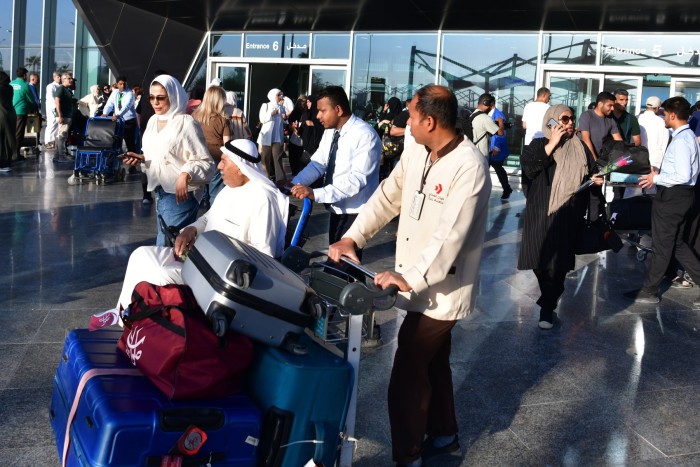Donald Trump’s decision to join Israel’s military campaign against Iran has shaken Gulf capitals that only weeks ago rolled out the red carpet for the US president and urged him to hold his fire.
While Gulf leaders last month feted Trump with pageantry and trillion dollar investment pledges, behind the scenes the monarchies pressed him to stick to diplomacy with Tehran and avoid a regional war they believe would threaten their security and stability.
Iran has long been a major political and military rival to the Gulf’s largest economies — Saudi Arabia and the United Arab Emirates — but they have sought to build bridges in recent years and the eruption of a volatile new Mideast conflict has unnerved the oil and gas rich states.
The Gulf waters that separate Iran from its Arab neighbours are narrow — just 200 miles across at its widest point and less than 50 at its tightest. Well within reach of Iran’s short-range missiles, and playing host to key US military bases, Gulf nations desperately want to avoid being dragged into the conflict.
But Gulf leaders also fear a prolonged conflict will destabilise Iran, a multi-ethnic state of some 90mn people, or push its rulers to take more drastic action, such as seeking a nuclear weapon. Both would leave the Gulf — which has spent recent years de-escalating tensions with Iran and improving relations — to deal with the chaotic aftermath of a war they neither started nor supported.
“The last time we saw war in the Middle East, we saw the fragmentation of the region,” said Albadr Alshateri, professor at the National Defence College in Abu Dhabi, citing the 2003 US-led invasion of Iraq which he said caused “irreparable damage”. The ensuing mayhem empowered Iran, inflamed sectarian tensions in the region and led to the birth of Sunni jihadist group Isis.

Although Alshateri judged the Iranian regime’s immediate fall to be unlikely, he pointed to the experience of carnage caused by attempted regime collapse in the wider Middle East. He added that for the Gulf, “this is closer”.
Initial reaction to the US strikes was marked by anxiety and apprehension. Citizens on Sunday morning felt “a mix of shock and concern,” said Eyad Alrefai, faculty member of King Abdulaziz University’s political science department in Saudi Arabia.
“Social media platforms are flooded with urgent discussions,” he added, with people voicing their worry over the escalation. “The atmosphere is charged with emotions”.
In Kuwait, the closest Gulf state to Iran physically, people had reacted on a “spectrum”, said a Kuwaiti consultant, “from those who are in denial that anything will ever come our way to those who are in total hoarding panic”. The state’s finance ministry reassured employees that its complex had shelters equipped to fit 900 people.
As British Airways became the latest western carrier to suspend flights to Dubai and Doha, two expatriate workers in Qatar said they had heard of parents keeping children home from school while some families had departed for summer holidays early.
And while nuclear monitors around the region told the public that there was no change in radiation levels, Bahrain sent 70 per cent of civil servants home, activated remote learning for schools and urged motorists to avoid main roads.
The campaign against Iran underscores how Israel’s military operations across the region are frustrating the Gulf’s desire to focus on their own economic development.
Gulf analysts argue Israel’s ambitions extend well beyond Iran. “Look at what they’re doing today within their direct environment” said Bader Al-Saif, assistant professor at Kuwait University, listing Israel’s military action in Lebanon, Syria and Iraq.
“What if they come out victorious with Iran? They’ll be dictating the show in the region and we can’t accept this.”
For the past week, the region’s leaders have condemned Israel’s offensive on their longtime rival, stayed in close contact with Tehran, and called for a return to talks between Iran and the Trump administration.
Gulf monarchies have forbidden the US from launching attacks on Iran from bases on their shores. Diplomats and analysts say they strongly advised Washington against such a move, alarmed that it would further stoke regional tensions and even leave Gulf states as targets of Iranian retaliation.
Gulf powerhouses Saudi Arabia and the UAE have had a stormy relationship with regional rival Iran. After Trump raised pressure on Iran in his first term, officials in Tehran warned they would damage the United Arab Emirates’ economy and frighten away expatriate workers. Iran was blamed for attacks on oil tankers in the Gulf sea and energy infrastructure in Saudi Arabia in 2019.
But the attacks elicited what the Gulf saw as a lacklustre US response, sowing doubt about the steadfastness of US security commitment that pushed several states towards seeking rapprochement with Tehran.
After several years of defusing tension, “the relationship between the Arab side and the Iranians is at its best”, said Alshateri.
Hasan Alhasan, Bahrain-based senior fellow for Middle East policy at the International Institute for Strategic Studies, said that for all the calls for urgent dialogue, the diplomatic sway of Gulf states was limited in this crisis.
“The best the Gulf states can do is be prepared, signal their non-involvement to Iran and keep the offer of mediation on the table,” Alhasan said.
The apparent lack of influence on Trump’s decisions comes despite the Gulf states’ efforts to burnish their relationship with the US since his return to power.
Analysts argue that Gulf-US relations remain strong, and statements on Sunday by Gulf countries were careful not to criticise Trump’s intervention explicitly. The only exception was Oman, the facilitator of US-Iran nuclear talks, which slammed the strikes as “illegal”.








